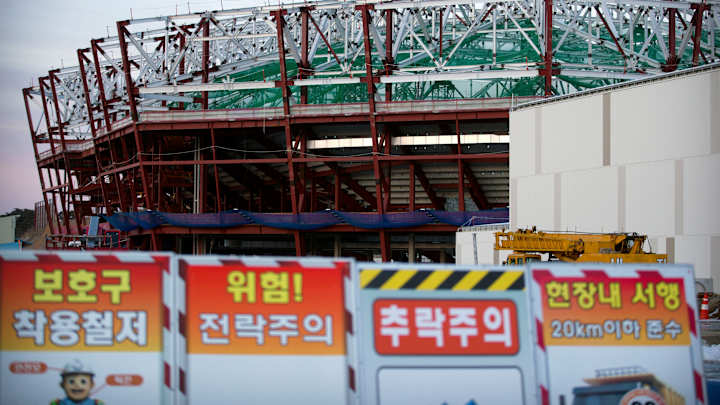From Copa To Korea: Winter Games in Pyeongchang next up

RIO DE JANEIRO (AP) Organizers of the 2018 Winter Olympics in Pyeongchang, South Korea, have set up a virtual-reality ski simulator - complete with fake, blowing snow - on Copacabana Beach.
''Having sun and sand is normal here, but not snow,'' said local Danieli Evangelista, stepping off the make-believe ski slope after waiting in line for 30 minutes for a taste of winter during the Summer Olympics. ''Hardly anyone here ever sees snow. It's very cool, a very real effect.''
It's also about to get very real for the next hosts of the Olympic Games.
''We're not ready to go today, but we're getting ready,'' Kim Jaeyoul, vice president of the Pyeongchang organizing committee, told The Associated Press.
South Korea's games will be the first of three straight in Asia, joining the Tokyo Summer Games in 2020 and the Beijing Winter Games in 2022. These come after a run of difficult games in Sochi, Russia, and now Rio de Janeiro, with the International Olympic Committee looking for ''a safe pair of hands,'' as Tokyo labeled its winning bid three years ago.
Yet organizers in Pyeongchang have struggled with construction delays, local conflicts over venues and a slow pace in attracting domestic sponsorship. This contrasts with the smoother run-ups to the 1988 Seoul Olympics and the 2002 World Cup that South Korea co-hosted with Japan.
''Unlike the 1988 Olympics and the 2002 World Cup, it was not the central government but a province that led the efforts to bring the Olympics,'' said Heejoon Chung, who teaches sports science at South Korea's Dong-A University. ''There is a sentiment that the Winter Games are more about Pyeongchang than the nation as a whole.''
The Pyeongchang organizing committee named Lee Hee-beom its new president three months ago. It was the second leadership change in two years, and that's worried the International Olympic Committee.
Lee bowed to IOC President Thomas Bach, and then to almost 100 IOC members, before addressing the full membership just days before the Rio Olympics opened.
''I'd like to assure you that our preparations are fully on track,'' Lee told them.
In introducing him, Bach called Lee a ''very dynamic and reliable leader,'' and joked that he ''promised he will be with us'' until the games take place.
Organizers say that after a rocky start, 90 percent of the sponsorship target of $760 million will be met at the end of the year. Sponsorship will provide about one-third of the 2.2 trillion won, or $2 billion, operating budget. Kim said the budget would be adjusted in the next few weeks, compensating for inflation.
Six new competition venues are about 80 percent complete, and a new high-speed rail line will be finished in June of 2017 and in operation the following January. The line will link Incheon airport to Pyeongchang and reduce travel time to 90 minutes from almost twice that much.
Pyeongchang is also building a controversial sliding center for bobsled, luge and skeleton, after rejecting an IOC suggestion that it use a complex previously constructed for the games in Nagano, Japan, to save money. The cost is 124 billion won ($112 million) for a venue that could be a white elephant if not managed properly.
Gunilla Lindberg, the IOC member heading the planning for Pyeongchang, said the sliding center and the International Broadcast Center are ''slightly delayed.''
Meantime, competition is heating up between South Korea and China over whose Olympic ski venue might ultimately become a destination for Asian tourists. Beijing planners have picked Zhangjiakou as the ski site for the 2022 games. Pyeongchang has some advantages, as it gets more natural snow than Zhangjiakou.
''A ski resort built for the Beijing Games is not going to be enough, considering the population of China,'' Kim said. ''We want to attract Chinese, but also Southeast Asians.''
Pyeongchang is in South Korea's Gangwon Province, and the central and provincial governments have been battling over who should pay the Olympic bills as skepticism grows about the long-term economic benefits of mega-sporting events, said Chung, the sports science professor.
''Pyeongchang mostly got what it wanted,'' Chung said, noting the province has pushed off costs to the central government. ''It has no choice. It's still the Olympics, and you don't want to look bad hosting it.''
---
Kim contributed from Seoul, South Korea.
---
Stephen Wade on Twitter: http://twitter.com/StephenWadeAP .His work can be found at http://bigstory.ap.org/content/stephen-wade
